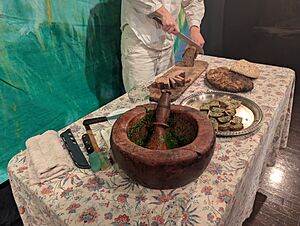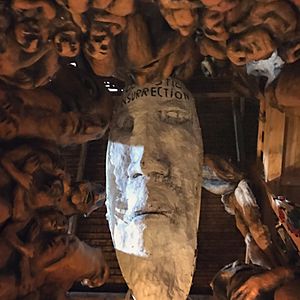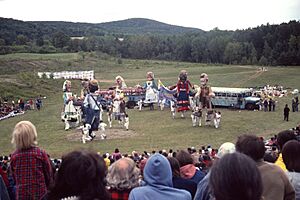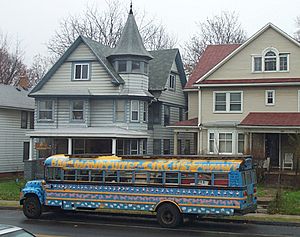Bread and Puppet Theater facts for kids
The Bread and Puppet Theater (often called Bread & Puppet) is a special puppet theater that shares strong messages about society and politics. It has been active since the 1960s and is based in Glover, Vermont. The theater was started by Elka and Peter Schumann. Peter Schumann is the main artistic director.
The name Bread & Puppet comes from two important ideas. First, the theater shares fresh bread with garlic sauce (aïoli) for free with the audience after each show. This helps create a feeling of community. Second, the theater believes that art should be as important and basic to life as bread is.
The Bread and Puppet Theater often takes part in parades, like Independence Day celebrations in Cabot, Vermont. They use many large puppets, including a funny Uncle Sam puppet on stilts.
Contents
History of the Bread and Puppet Theater
Peter and Elka Schumann started the Bread & Puppet Theater in 1963 in New York City. During the Vietnam War, they were very active in protests against the war, mostly in New York City. A puppet show from Sicily gave Peter Schumann the idea for his theater. Bread & Puppet then inspired other groups across the country.
In 1970, the theater moved to Vermont. First, they were at Goddard College in Plainfield. Later, they moved to a farm in Glover, where they still are today. This farm is home to animals like a cow, pigs, and chickens. It also has places for performances, a print shop, a store, and a big museum. The museum shows more than 40 years of the theater's amazing work. The Bread & Puppet Theater has received awards from different groups, including the Puppeteers of America.
In 1984 and 1985, they toured colleges with a play called The Door. This play told the story of people from Guatemala and El Salvador who were trying to escape difficult situations. The play used very few spoken words but showed its message simply and beautifully.
Until 1998, Bread & Puppet held a big yearly show and circus called Our Domestic Resurrection Circus at their farm in Glover. In the 1990s, this event became very popular, with tens of thousands of people attending. Many people camped on nearby farms. The event grew so large that it became hard to manage. In 1998, a sad accident happened during the festival, which led Peter Schumann to cancel the event.
Since then, the theater offers smaller shows on weekends throughout the summer. They also travel around New York and New England, and sometimes tour other parts of the U.S. and even other countries. The theater has a program where young people can learn and help create and perform in the shows. Every year during the holiday season, Bread & Puppet performs in New York City at the Theater for the New City.
In August 2021, Elka Schumann passed away at the age of 85. She was buried in a pine grove on the theater's farm.
What Bread and Puppet Believes In
"Cheap Art" and How the Theater is Funded
The Bread & Puppet Theater follows a special idea they call the "Why Cheap Art" manifesto. This idea means that art should be available to everyone, not just for museums or rich people. The theater believes that "art is not a business." Their shows are often free or ask for a small donation. They also sell art for "very little money."
The theater runs on a very small budget. This means that the people who work there have historically been paid very little. Many items used for the shows, like clothes and puppet materials, are found second-hand or given as donations. The theater usually gets money for its shows by going on tour. Even though government grants are available, Peter Schumann often chooses not to take them. He believes that not having outside money allows him to be "freer to experiment." This way of thinking led Schumann to change how the theater was run in 1973. He wanted to make sure the theater stayed true to its beliefs and did not become too much like a "professional theater."
"Cheap art" is a main idea for the theater. It shows in both their beliefs and how their art looks. The theater is seen as being against big business and having a "hippie" point of view. The art itself is often described as looking "homemade" or "simple," but also very unique.
Important Causes the Theater Supports
The Bread & Puppet Theater uses its shows to support many important causes. These include:
- Being against warfare.
- Being against signing up for the military draft.
- Being against the World Trade Organization.
- Supporting the closing of the Vermont Yankee Nuclear Power Plant.
- Supporting the Sandinista revolution in Nicaragua (1979–1990).
- Supporting the Zapatista uprising in 1994.
- Supporting the MOVE organization.
Works and Performances

Selected Performances
Fire (1965)
This hour-long play was about the war in Vietnam. It was dedicated to American protesters who died after setting themselves on fire. The play showed what life was like for Vietnamese villagers during the war.
Birdcatcher in Hell (1971)
This play was a type of Japanese comedy called kyōgen. It was about President Nixon's decision to pardon soldiers involved in the My Lai massacre.
Stations of the Cross (1972)
This play was a modern version of the New Testament story of Jesus' suffering on his way to his crucifixion. It was the first time that Sacred Harp music was used in a Bread and Puppet show. Elka Schumann said the play was also a way to talk about the Cuban Missile Crisis.
Joan of Arc (1979)
This show used music and puppets to tell the story of St. Joan. It was performed again in 1999. In 2009, Taiwan was the first country in Asia to show the new version of Joan of Arc.
Mending the Sky/Bu Tian (1994)
This was a show created with the 425 Environmental Theatre in Taipei, Taiwan. The play focused on pollution problems in Taiwan. It used ideas from traditional Chinese stories, like the goddess Nüwa. The show talked about the pollution of the Tamsui River in its first performances. Later, it focused on other polluted places depending on where the show was performed. Even though some people questioned the environmental practices of the other theater group, the show was praised for its important messages about society.
Bread Baker's Cantata (1999)
This play was performed along with the new version of Joan of Arc. It was a slow play that showed an old woman's last day on Earth using singers and actors.
Combined Insurrection/Resurrection Services (2020)
This was the first show after the COVID-19 pandemic caused them to cancel a tour. The performance used paintings, dancers, and a "fiddle lecture." It talked about the public response to the virus and police brutality. It also showed themes of uprising and sadness, including "laments" for those who died from the virus and for George Floyd.
Other Performances by Decade
Here are more shows, listed by when they first appeared:
| Years | Theatrical Performances | Pageants and Circuses |
|---|---|---|
| 1963–1969 | The Story of the World, The Christmas Story, The King Story, Eating and Drinking in the Year of Our Lord, Leaf Feeling the Moonlight, The Pied Piper of Harlem, The Puppet Christ, Chicken Story, The Gray Lady Cantata #1, Wounds of Vietnam, The Dead Man Rises, A Man Says Goodbye to his Mother, The Cry of the People for Meat, Theater of War, Blue Raven Beauty | |
| 1970–1979 | The Fourteen Stations of the Cross, The Gray Lady Cantata #2-#6, That Simple Light May Rise out of Complicated Darkness, Hallelujah, Laos, Harvey Mcleod, The Revenge of the Law, Attica, Jepthe, Ishi, The Last of the Indians, Jesu Meine Freude, White Horse Butcher, Passion, Masaniello, The Lamentations of Jeremiah the Prophet, Carmina Burana, Ave Maris Stella | Our Domestic Resurrection Circus
|
| 1980–1989 | The Story of Bread, Histoire Du Pain, Swords and Ploughshares, Woyzeck, Venus Rising From the Water, The Thunderstorm of the Youngest Child, Fear, Diagonal Man-Theory, Josephine the Singer, Mozart Requiem, Ex Voto I-III, Daily News Nativity, Bach's Christ Lag in Todesbanden, Farmer's Dream?, Stravinsky's Symphony of Psalms, The Evils of Power, Uneasy Equilibrium of 2 Societies, | Our Domestic Resurrection Circus
|
| 1990–1999 | Uprising of the Beast, President and Chair, Nativity 1992, Axe and Angel, Stone Soup, Fly or Die, Oedipus Rex, B2 Bomber Show, Delivery, Insurrection Mass with a Funeral March for a Rotten Idea, The Proletarians, The Penny Opera, City of Brotherly Love Passion Play | Our Domestic Resurrection Circus
Humdrum Glorification Kaboodle Performances |
| 2000–2009 | The Paper Mache Cathedral of the Seven Basic Needs, Red Zone of Genoa Oratorio, Radical Cheese Festival, Public Participation Uprising, Depleted Uranium Cantata, How to Turn Distress Into Success, Full Spectrum Domination, Enemy of Nature Oratorio, Imminent Attack, Light Shining in Glover, World on Fire, Daughter Courage, Shoes, Passion Play of the Correct Moment, Battle of Terrorists and Horrorists, Ice Cold Reality Under The Feet of the Occupier, Lubberland: No, No, Yes, Guantanamo, Lubberland: World Can't Wait Dances, Storm Office, We sh Cantastoria, Sourdough Philosophy Cabaret, Dirt Cheap Money Cabaret, Tear Open The Door of Heaven, This, Requiem for Haiti Relief, Lubberland: 13 Dirt Floor Cathedral Dances | Solomon Grundy Circus, Circus of the Possibilitarians, Victory over Everything Circus and Pageant, First World Insurrection Circus, Upside World Arise Circus, National Circus of the Correct Moment, Cardboard Celebration Circus, Victory Circus and Pageant, Welcome Circus, Everything is FIne Circus, Divine Reality Comedy Circus, Sourdough Philosophy Circus, Dirt Cheap Money Circus and Pageant, Mud Season Circus with Danville Elementary |
| 2010–2019 | Shatterer of Worlds, A Thing Done in A Seeing Place, Piero della Francesca, Captain Boycott, The Horizontalists, Public Access Center for the Obvious Presents: History, Public Access Center for the Obvious Presents: The Situation, Underneath the Above Show #1, Dust, The Seditious Conspiracy Theater Presents: A Monument to Political Prisoner Oscar Lopez Rivera, Disordering the Existing Order of Life Oratorio, Faust 3, The Gates of Unfinished Life, TINA, The Honey Let's Go Home Opera, Post-Apocalypse for ¾ Empire, Mahmoud Darwish, The Basic Byebye Show, Dignity Milk, Water Protectors' Parade, Prison Demolition and Composting Parade, Out of Joint Hamlet, Nieve en las Cordilleras, Or Else, Life Little Life, Zero Degrees, Gaza, Diagonal Life: Theory and Praxis, The Diagonal Yes, The Diagonal Man Imperative, Man on Fire, Emma, The Extiction Rebellion Parade, The Essential Furthermore, The Bad Bedsheet Existibility Show, | Decapitalization Circus, Man=Carrot Circus, The Complete Everything Everywhere Dance Circus, Pageant of the Possibilitarians, Total This and That Circus, Nothing Is Not Ready Circus, Gaza Emergency Pageant, Tar Sands Manifesto Pageant, Overtakelessness Circus, Comet's Passage Over Reality Pageant, Whatforward Circus, Onward Pageant, Our Domestic Insurrection Circus & Pageant, The Grasshopper Rebellion Circus & Pageant, Grasshopper Rebellion Circus & Naked Truth Pageant, Diagonal Life Circus and Normality Pageant |
| 2020–2023 | The Trident Show, Paper Man and Paper Woman Go To the Moon, Parking Lot Dance Company, Declaration of Light, The History of Laughter, The Persians, Finished Waiting, The Theory of Our Needs, Ophelia, The University of Majd, Inflammatory Earthling Rants (with Help From Kropotkin), Idiots of the World Unite Against the Idiot System, Hypocrisy Democracy Dance Company Shows, Mother Dirt Church Services, The Heart of the Matter | Driveway Circus, Winter Pageant, Our Domestic Resurrection Circus & Pageant, Apocalypse Defiance Circus |
Books and Publications
Besides the theater, some of the Bread & Puppet puppeteers also run the Bread & Puppet Press. This press is led by Elka Schumann, Peter Schumann's wife. The press creates posters, cards, and books about the theater's ideas, as well as other forms of "cheap art."
Publications from the Bread & Puppet Press include:
- Cheap art manifestos
- 10 Purposes of Cheap Art
- Importance of Cheap Art
- Why Cheap Art?
- Comics
- 40 How Tos
- Courage
- Life and Death of Charolette Solomon
- Off to Lubberland
- Planet Kasper Volume I
- We Grass
Notable People Who Have Contributed
Some well-known writers and performers who have worked with the theater include:
- Children's theater performer Paul Zaloom.
- Writer Grace Paley.
- Artist and writer Suze Rotolo.
Challenges and Events
2000 Republican National Convention
Some Bread & Puppet volunteers were among the people who were arrested at a warehouse in Philadelphia during the 2000 Republican National Convention. News helicopters showed the scene live. Years later, it was explained that there were worries (which turned out to be false) about dangerous plans being made at the "puppetista" headquarters.
Linda Elbow, who manages the Bread & Puppet company, said, "A couple of our folks were down there, helping to build puppets. The police went into the studio... arrested people, and took the puppets. So, now, puppets are criminals."
2001 Halloween Parade
The Bread & Puppet Theater often takes part in New York's Village Halloween Parade, known for its huge puppets. In 2001, Bread & Puppet did not march in the parade. Their plan that year was to show a performance protesting the War in Afghanistan. The Halloween parade was scheduled to happen about 50 days after the September 11, 2001, attack on the World Trade Center. This attack was why the war started, and the theater's "anti-war stance" was not popular with some New Yorkers.
Linda Elbow said, "We certainly weren't saying 'Hooray for the terrorists.' We were saying, 'Look what you're doing to the people of Afghanistan.'" It seems the group's message was not wanted that year.
In December 2001, the theater returned to New York with a show called The Insurrection Mass with Funeral March for a Rotten Idea: A Special Mass for the Aftermath of the Events of September 11th. It was performed at Theater for the New City. "Insurrection masses" and "funerals" for "rotten ideas" are common types of shows for the Bread & Puppet Theater.
What Critics Say
Many writers have praised Bread & Puppet. Historian Howard Zinn said it had "magic, beauty, and power." Poet and NPR commentator Andrei Codrescu wrote that the theater has been a part of America's efforts for a better society for a long time.
The theater's protests against the Vietnam War and its message of peace usually received good television coverage. Keith Lampe, writing in WIN magazine, also praised Peter Schumann's focus on "movement," "sound," and "appearance" in the theater's 1966 anti-war demonstration.
In 2015, Gia Kourlas wrote a review in the New York Times about the theater's show The Seditious Conspiracy Theater Presents: A Monument to the Puerto Rican Political Prisoner Oscar Lopez Rivera. She described the show as "patchy" and sometimes "more cute than pointed." She also felt it was mostly speaking to people who already agreed with its message.
Influence of the Theater
The Bread & Puppet Theater is shown in the 2007 Julie Taymor film Across the Universe. The movie copied characters like Uncle Fatso, Washer Women, White Ladies, and the many-armed Mother head. The costumes of the circus band in the movie's "Being for the Benefit of Mr. Kite!" scene also look like the Bread & Puppet Circus Band. The real costumes are red and black, while in the movie they are white and black. The Bread & Puppet Theater is mentioned in the film's credits.
In her 2008 book A Freewheelin' Time: A Memoir of Greenwich Village In The Sixties, New York artist Suze Rotolo wrote that she worked with Bread & Puppet in early 1963. She described Peter Schumann as a "very sincere and committed man" and a "true visionary."
In his book Chronicles: Volume One, Bob Dylan mentions Peter Schumann being at a party for folk singer Cisco Houston. Dylan also talked about the Bread and Puppet Theater play, Christmas Story.
In the Czech Republic, a puppet group called Buchtky a Loutky (meaning "Cake and Puppets") was formed in Prague in the 1990s. Their name is a nod to the Bread and Puppet theater.
See also
 In Spanish: Bread and Puppet Theatre para niños
In Spanish: Bread and Puppet Theatre para niños
- Cantastoria
- In the Heart of the Beast Puppet and Mask Theatre
- Paperhand Puppet Intervention




